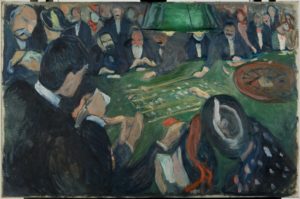
Modernism and the Green Baize
All of the mundane, even offensive qualities of green baize, its resolute materiality, its potential toxicity, its decelerating and silencing effects on items of play, its easiness on players’ eyes, its associations with the bourgeois interior, and with forms of leisure such as billiards and gambling that were increasingly moralized and pathologized, turned up in Kandinsky’s full-throated rejection of green as bourgeois and cow-like.









